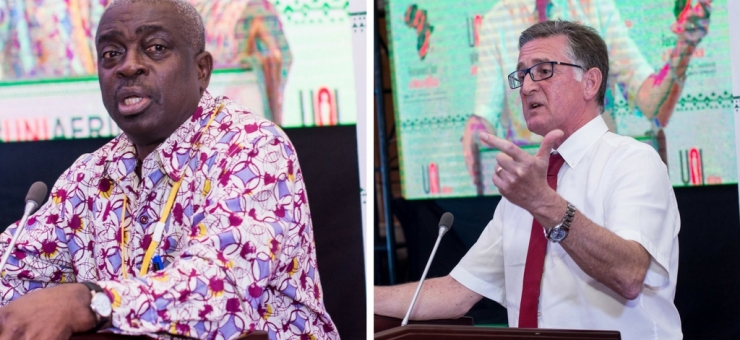News
General Secretaries of UNI Global & ITUC Africa: reclaiming Africa for the people

Speaking to the motion ‘Claiming Back the Economies for a Sustainable Future’, heavyweight speakers UNI Global Union General Secretary, Philip Jennings and Kwasi Adu-Amankwah, General Secretary of ITUC Africa, both called on unions to reclaim the wealth that rightfully belongs to them.
Kwasi said that Africa’s path to achieving the Sustainable Development Goals was being blocked by widespread poverty, and wide inequality between the regions and the within the regions and the countries underlined by high levels of unemployment.
He said, “One out of two Africans lives in poverty on less than $1.25 a day and only 10% have proper social protection, education and healthcare. There are only 3 doctors per 10,000 people in Africa whereas in Europe its 33.”
“Another stark statistic is that 77% of workers are in vulnerable jobs with poor health and safety conditions, and the majority are women and young people.”
He added that these conditions breed xenophobia and extremism.
However, the ITUC-Africa General Secretary said that unions had the answers but they had to grow, organise and increase their density on the ground.
“Unions must join together to be powerful, promote organising and include the power of women. We must engage at national level together with campaigns on health and education and we must work closer with civil society.”
Kwasi also emphasised the importance of just transition in climate change in Africa.
UNI Global Union General Secretary Philip Jennings began by paying tribute to Kwasi’s vision.
Paraphrasing Mandela, Jennings said, “We must make our choices based on hope not fear. Let’s not forget that in Africa money is being made. It’s the fastest growing region in the world along with China. But something is very wrong because this money is not reaching the people. You are the African Lion economies but you are not receiving the dividends of your work.
“The experts agree that long term growth of Africa is assured but our job is to make sure that this new wealth is distributed amongst the workers. In the next twenty years, Africa will have 180-200 million young people. This population growth will see new mega-cities grow up with infrastructure, hospitals and jobs, especially in the service sectors that we represent. Therefore unions must demand proper jobs strategies from your governments – if they don’t listen don’t vote for them.”
Jennings went on to attack the vultures on Wall Street who demand unreasonable rates of return on investment and set out to pick dry the bones of Africa and suck out the wealth.
“The choices being made in Africa are being made by other forces outside of the continent which makes it impossible for human development. This must change! Africa has what the world wants – you need credible alternatives. They exist: Africa has two-thirds of the world’s arable land, and could feed the world,” Jennings said.
The UNI GS said Africa must become a digital success and the Telecoms companies must not be allowed to outsource engineering and IT skills outside of the continent.
“I object to Telecom companies outsourcing outside of Africa – they are trying to squeeze blood from a stone.”
Jennings said Africa was unfortunately a story of those from outside taking advantage with $1.3 trillion being stolen from the continent in the last 30 years and many non-African companies being prosecuted for corruption in Africa. Doing business in Africa should not be a license to steal from Africa,” he concluded.
The UNI GS also brought attention to the economic consequences of gender inequality in Africa, costing $105 billion a year.
Jennings agreed with Kwasi that unions had a major role to play in turning back all these tides and said that through its Breaking Through organising strategy UNI was winning with more 50 global agreements. He confirmed UNI Global Union’s dedication to Africa through its commitment to UNI Africa.
Jennings ended his address to conference by saying, “Africa is in your hands – we have a commitment and desire to grow the presence of UNI Africa in all our sectors. We urge our African affiliates to make their presence felt at our World Conference in Liverpool next year where we will celebrate the centenary of Nelson Mandela’s birth.”

